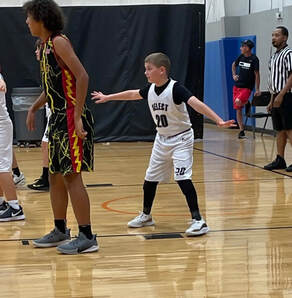Bridging Leadership Lessons from the Workplace and Those Experiences Shaping Today's Youth and Tomorrow's Leaders
 My last post was targeted at parents who were trying to determine if it was okay to play their child up a grade in sports. This is based on parents trying to challenge and develop their kids putting them in a position where they will have to face tougher competition. They typically are looking for life lessons that they hope will prepare them for high school and beyond. So, on one level, you have the parent challenging their child. On another level you have the trophy chasers who put their high end select travel team into school division tournaments or AAA baseball or softball teams to build up their resume by heading to smaller communities to take on single A teams. That’s not illegal but bordering on being unethical and for sure lacking honor and sportsmanship. Coaches who would rather win against bad teams than lose against good teams fail to do the one thing they are responsible for - develop their players as competitors and people. But there is an even darker side to youth sports, even beyond the craziness of parents in the stands (yes, that will be a future post as well!). Where parents and/or coaches are so blinded by winning or generating fame that they will knowingly bend, break, and trample the rules without a second thought. Now, driven by the power and hype of social media, the new trend is for parents to play their kids DOWN a grade! Welcome to the Crazy World of Sports literally March Madness. Holding kids back a grade is understood when they are young based upon educational, physical, social, or emotional development struggles. Prior to Kindergarten, it is commonly recommended by the school system that boys born in the summer months should wait for the following year to begin school. Some of you may remember almost 20 years ago when a dynamic pitcher took the U.S. by storm throwing a perfect game in the Little League World Series. Danny Almonte was born in the Dominican Republic and moved to the Bronx to be with his father. He led his team to the U.S. championship game but lost when he had used up all of his innings to pitch. He struck out 62 of 72 batters and only gave up 3 hits! A dominant performance for any 12-year-old. But the sad reality is that he wasn’t 12, he was 14. The teams and coaches had complained that the young man didn’t look like a typical 12-year-old and definitely didn’t throw like one. For any of you that have had kids play travel ball, you know the feeling. How many times have you said, “Did he drive here?” “Is she a player coach?” When it came to light, the team had to forfeit all its games and they were stricken from the record books. The rest of the team had to pay the price because a parent was more concerned with their child's fame and success than the rest of the team or simply, honor. Did the coaches know? Did the parents know? What about the kids? Was he able to keep up a like for 2 years never revealing his age? It’s more plausible in this case where birth certificates are not common when moving to a new country. But it isn’t only in those situations. Around 2004, I took a mix of 1st - 3rd grade boys to play in an AAU tournament. We were playing up in the 3rd grade division and in our first game we were throttled something like 60-2. I was amazed at the size of these kids and how in 3rd grade they were shooting step back 3 pointers. Something that wasn’t as prevalent then as it is now. The referee came up to me after the game and said, “Just because this is a kid’s game, doesn’t mean the coaches don’t cheat.” I looked at him quizzically, and he said, “There’s no way those kids are in 3rd grade.” Our next game we were defeated soundly again but it was much more competitive. I talked to the coach before the game about the previous team we played, and he proceeded to tell me that a couple of the kids were 5th graders. He knows this because he coached one of the kids in football! Needless to say, that team did not advance when this was brought to light. Now fast forward to today, with social media highlighting every play. Select teams have media specialists who market their players to all the national websites and sources. It is a huge business where every parent thinks their child is the next LeBron or Zion. With social media highlighting individuals more than the team, and hype versus substance is what is celebrated, parents are looking to get a leg up on the competition - defined as everyone who is not their child! Welcome to the world of reclassifying! Initially, this was seen as a way to prepare for college and common practice with the eastern Prep Schools so players can get another year of development before entering college. For those very gifted high school seniors, some will reclassify to enter college sooner to fast track their way to the NBA and get round the rule requiring a person to be one year removed from high school before entering the draft. But I’m not talking about high school seniors. Parents have begun to reclassify their 7th or 8th grade child, to give them the advantage of being a year older and more developed than their classmates. Many times, they will do this when moving between schools such as Middle School to Junior High. It is not about their development, but the positioning of their child for near term success. These are kids who are already physically developing and may be on the older end of the grade who will then be held back so that they can be a dominant player against kids that are 1 to 2 years younger than them. Interestingly enough, in the basketball community, this isn’t met with outward disdain as you would expect for someone who is trying to game the system. In many cases they applaud the move, typically because they are hoping he will play with their travel team or school team. As an Old School type of basketball fan, I struggle with this mindset. Especially, when the parents and the “Hype Team” surrounding youth basketball shamelessly post highlights of the 15-year-old dominating the 13-year-old team. Parents should know better, and you would think they would feel guilt. But they don’t. You can say the kids should know better, but if it is being pushed by the parent, well, chances are they may have a different view of right and wrong. Plus, when their twitter followers and Instagram posts are being shared, the euphoria can be too much. So, while these parents are clearing the pathway for success today, what will the future hold? What happens when the gym lights go out and the highlight dunk doesn’t translate to the real world? The question is whether the glory they are feeling today will lead to success and impact Beyond Today?
5 Comments
Jessica
1/21/2024 09:34:21 am
So what about the kids who are young for their grade and physically would have a better chance of getting a college scholarship if they were held back a grade and graduated with others their same age? We have a son in 9th grade that plays basketball. He loves the sport and wants to dreams of playing D1. As a parent, I only want to support what his dreams are- not my own. If he reclassed, he would have another year for his body to develop and gain more of a chance he’d be given one. What is unethical about that exactly? It isn’t about fame- I could care less about whether he plays or not. HE has a goal and he is focused and approached ME about doing this. He is really good. He may get a scholarship without reclassing but his chances would go up if we allow his body to catch up. Is it wrong to reclass a child who academically doesn’t need to but physically and socially does? What makes one thing more or less important than the other? Intellectual growth is not the sole purpose of school, is it? Our kids are developing socially and physically and emotionally in the process too. Shouldn’t weight be put on the importance of those things? Will my kid be ready to go off to college at 17?! Not really- so not mature enough at that age imo. We haven’t asked yet to reclass but the school has a policy in place that says it isn’t allowed unless the child is failing. What is wrong to want to give my child an scholarship advantage when he is reclassing to graduate with kids his own age?! I am curious what your thoughts are in this scenario. Is it really cheating if physically he would be the same age as others a grade down? He could continue taking classes in accordance to his intellectual level so he would not be wasting his time. He could actually take more dual enrollment classes and possibly graduate a year early from college saving even more money in the long run if a scholarship is not an option- if he plays in college or not! There are definite advantages to holding him back that don’t take opportunities away from other students. I know that is the worry for administrators- fairness- but isn’t it fair to put my son with other kids HIS AGE in the hopes that physically he is getting the most advantage he can get? If you can skip grades to gain advantage academically, why shouldn’t parents determine if they can hold their kids back to have them physically and socially be on a level playing field so to speak? Do you see this as unfair and if so, why?
Reply
Tom
1/21/2024 10:53:46 am
Great points, Jessica.
Reply
Anonymous
4/4/2024 05:35:06 pm
I know a few kids that graduated a year ahead, all very talented. They always played up, not down. If the fire is in them, They benefit more from playing up, not down. Reclassification and playing down is false advertising.
Reply
Kim Gonzalez
3/10/2024 11:25:00 am
I have an issue with reclassification as it is only allowed in private schools. I also think that it is changed over the years and now parents are just gaming the system and trying to give their kids an extra year, regardless of whether or not, they’re young or small for their age. Classification is not allowed everywhere. It should not be allowed anywhere.
Reply
Tom
3/15/2024 07:55:36 am
I'm definitely not a fan of the reclassification for the sake of getting an advantage. Much like the "transferring" that happens as well in both private and public schools. They are losing sight of what high school sports are about - creating pride in your school and building character in the STUDENT athletes.
Reply
Leave a Reply. |
AuthorTom Brown - a husband and a father who is simply trying to make a difference. Using my experience as a Manufacturing Executive to connect leadership from the boardroom to the hardwood to help teams grow and develop to make a difference in the lives of others. Archives
May 2024
Categories |
Proudly powered by Weebly

 RSS Feed
RSS Feed

